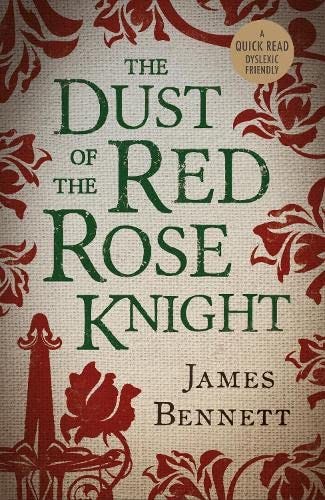Recent Books I’ve Read
Since wading through The Lord of the Rings twice I’ve racked up some highly entertaining books under my belt. After realising a couple of years ago I wasn’t reading a fraction of what I should be, I’ve made a concerted effort to avoid the news and other distractions and buckle down. Both Lee Child and Alan Moore abjure anyone who wants to write to read anything and everything all the time. It’s advice I try to follow, and the 99p Kindle offers that pop into my email box once a week have led me down some very interesting roads. Anyway - here’s a choice of four books I’ve read in the last month.
The Dust of the Red Rose Knight, James Bennett, 2023
I picked this one up at Eastercon. A hugely entertaining and very witty queer Arthurian tale. Not only did it perfectly capture the atmosphere of those old romances but also reminded me a little of Lord Dunsany's fables such as The Fortress Unvanquishable, Save for Sacnoth. Highly recommended! Modern Arthuriana can often be a bit New-Agey and po-faced. The Dust of the Red Rose Knight makes for a fresh and entirely delightful change.
The Vory: Russia's Super Mafia, Mark Galeotti, 2018
A fascinating history of the origin and rise of Russia’s ‘thieves world’. Mainly originating in the brutal Gulag system, it came into its own in the post-Soviet world where opportunistic gangsters entered into a symbiotic relationship with the growing, immense black market in goods and services. Galeotti argues that in post USSR Russia, during the 90s, the boundary between the state and this twilight world became seriously blurred. Recently, despite images of the Vory in western cinema as an easy go-to image of all-pervasive international evil, the old traditions have long declined, and most of the modern generation of thieves are more interested in easier and more ‘legitimate’ forms of business than the old extortion rackets. The book was written in 2018 and Galeotti ends on an optimistic note, seeing hope in what he (and those he interviews) see as the Russian state’s gradual move towards more legitimate government along European models. Sadly the opposite now appears to be true.
Ship of Magic, Robin Hobb, 1998
I really like Robin Hobb as a writer, and thoroughly enjoyed her Farseer trilogy. Some people find her writing too much of a slow burn, but it ensures a richness of character and setting that’s well worth investing time in. Ship of Magic is the first in her massive Liveship Traders trilogy and apparently some readers think it is her best work. I wouldn’t go that far, although I found the book interesting and very well written. It does feel a bit all over the place sometimes, as if she’s trying to cover too big a canvas. Situations oscillate between really gripping tales of piracy and subtle magic, and an odd, though still compelling, subplot that reads like a Jane Austen novel with a bit of sorcery chucked in. The liveships themselves - figureheads invested with consciousness and intelligence through the powers of the magic wood they’re carved from, are occasionally ever so borderline twee, but not to any extent that it matters. Enjoyed it very much.
And Then What?: Inside Stories of 21st-Century Diplomacy, Catherine Ashton, 2023
Before the travesty of Brexit, Catherine Ashton was the EU’s first High Representative for Foreign Affairs and Security. Her book offers insider views of the power-broking and discussions behind a range of international crises in Egypt, Somalia (pirates), Haiti, the Ukraine (pre-invasion) and elsewhere. It’s very interesting how so many of the debates were around the minutiae of official statements and the precision of language. It’s a bit tumpty-tum style-wise, partly due to the repetitive nature of the work she was doing, but fascinating nonetheless, harking to not-so-recent past when the UK was a central part of international politics and peace-keeping instead of the broken-down clown car it is now.





